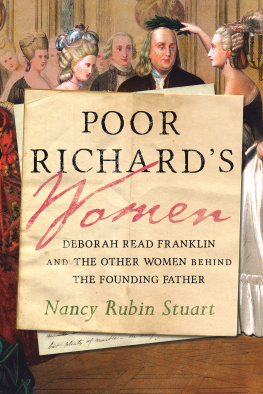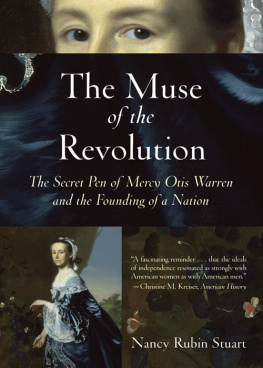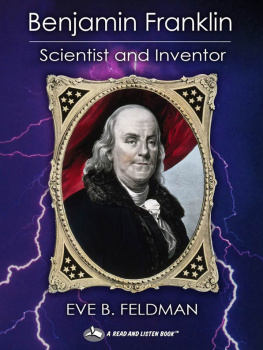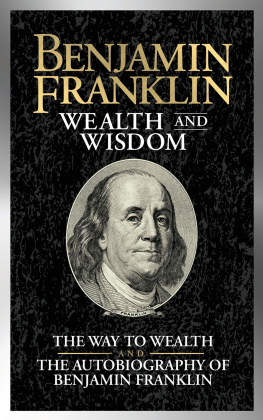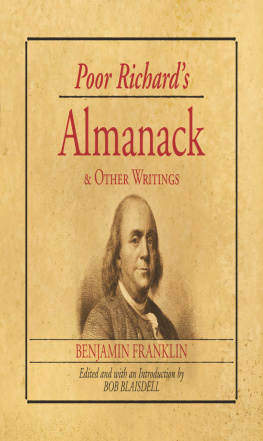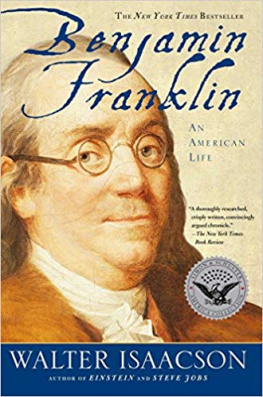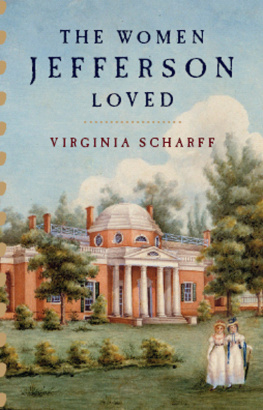Contents
Pagebreaks of the print version
Guide
ALSO BY NANCY RUBIN STUART
The New Suburban Woman: Beyond Myth and Motherhood
The Mother Mirror: How a Generation of Women Is Changing Motherhood in America
Isabella of Castile: The First Renaissance Queen
American Empress: The Life and Times of Marjorie Merriweather Post
Club Dance: The Show, the Steps, the Spirit of Country
The Reluctant Spiritualist: The Life of Maggie Fox
The Muse of the Revolution: The Secret Pen of Mercy Otis Warren and the Founding of a Nation
Defiant Brides: The Untold Story of Two Revolutionary-Era Women and the Radical Men They Married

To Wendy
Introduction
BENJAMIN FRANKLIN LIKED WOMEN . Occasionally, he even loved them. Throughout his life Ben was fascinated by the fair sex but considered the currents between them as dangerous as electricity. Still he pursued women as boldly and persistently as he conducted scientific experiments. There was one difference. Experiments required close attention, but Ben kept his sweethearts at a distance of ten leagues.
While Bens iconic image remains that of a man who embraced reason over emotion, a second, more erotic image persists: as a womanizer who fathered at least a dozen children and left a string of broken hearts in his wake. Neither of these images is realistic; Bens life was neither wholly pragmatic nor preoccupied with prurient intrigues.
For generations his flirtations with women have been exploited in popular culture, diminishing his achievements and the complexity of his personal attachments. By examining Bens correspondence with his wife, Deborah; his writings on sexuality; and his relationships with his sweethearts Catharine Ray, Madame Brillon, and Madame Helvtius, this book attempts to portray a man who privately struggled with prudence and passion. It also depicts his dependence upon the women who served as nurturers, caretakers, companions, financial assistants, and sexual objects. By doing so, these pages reveal the importance of Bens women to his happiness and well-being, deepening our understanding of him beyond traditional analyses of his commercial, scientific, and political achievements.
One event that earlier historians acknowledged was the birth of Bens son William, who was born out of wedlock. Despite the public taunts over Williams birth directed at Ben by his political enemies, he never apologized for his sexual behavior. Even when newly married to Deborah, Bens Rules and Maxims for Promoting Marital Happiness in the Pennsylvania Gazette warned wives that their spouses had flaws, for her husband is a man, not an angel.
Thousands of books have been written about Benjamin Franklin, most by male historians: scholars and biographers who focused upon his scientific, diplomatic, and political achievements. Many of those biographies portrayed his wife, Deborah, as a dull, even stupid woman. Several factors contributed to that image. Bens Autobiography mentions her only briefly and with little emotion. Exacerbating Deborahs shadowy image is an absence of historical information about her youth and the early years of her marriage to Ben. Unfortunately, even the letters she wrote from 1757 to 1762, during Bens first assignment as a colonial agent to England, are lost. It was only from his second London trip, 1764 to 1775, that Deborahs letters were preserved. Finally we hear her voice, although only in the last decade of her life.
Replete with spelling and grammatical errors, her letters were often cited by historians as proof that Deborah was an ignorant, provincial woman, hardly a suitable mate for the future founding father. Only recently, thanks to scholarship on womens history, has it been established that Deborah, like most colonial women, was never taught the rudiments of syntax or spelling, since that skill was considered unnecessary for future wives and mothers. Now I am to returne your thankes for the Pictuer for the Hankeshcer I gave Salley al of them thay is verey hansum... is just one example of Deborahs writing. Since her letters can be difficult to decipher, I have modernized spelling and syntax in these pages.
Nevertheless, Deborahs correspondence reveals a woman far more capable than earlier historians originally assumed. While not intellectually brilliant like Ben, Deborah was an astute businesswoman and devoted helpmate who not only contributed to his early success but also attended to his complex business affairs during his years overseas. In Bens absence she shouldered many duties men traditionally performed. Ben trusted her competence so thoroughly that he awarded her power of attorney two times before embarking on trips. During his long absences overseas, Deborah also fulfilled other obligations men usually assumed. These included supervision of construction for the half-built Franklin house, defense of that house at gunpoint during a Stamp Act riot, purchase of a costly property that enlarged Franklin Court, and management of the colonial postmaster-ship while Bens substitute was being trained.
On a personal level, Deborah was equally remarkable. While raising Bens son, William, and her own daughter, Sally, Deborah managed a successful store, hosted and entertained visitors who admired Bens work, nursed sick friends and relatives, managed Bens financial affairs when he traveled, and won the friendship of Philadelphias leading citizens. A devoted wife, she nursed Ben when he was ill, sent him home-cooked foods on the Pennsylvania frontier, wrote regularly to him in London (despite his infrequent responses), and diplomatically exchanged gifts with his English female companion. Even during Deborahs last illness, she relayed colonial news and shipped gifts and food to Ben in London.
These pages depict other women important to Bens life. Among them was twenty-three-year-old Catharine Ray, with whom the middle-aged Ben had a fleetingly passionate relationship. Even later, when Catharine was married and the mother of six children, she maintained a warm friendship with the scientist-statesman.
Historians have also dismissed Bens beloved companion, the widowed Margaret Stevenson, the landlady he lived with during his two assignments in England, from 1757 to 1762 and from 1764 to 1775. During their fifteen years together, she served as a kind of second wife who nursed Ben when he was ill; provided meals; outfitted him in stylish English clothes; attended plays, concerts, and dinners with him; and hosted their friends in her Craven Street townhouse. For all Margarets urban sophistication, she had many qualities similar to Deborahs. A warm and devoted companion with a spirited temperament, she, too, wrote and spelled poorly. Like Deborah, Margaret had only one child, a daughter, Polly, upon whom she doted. During Bens years in London he became so attached to the mother and daughter that he considered them his English family. Bens deep affection for Margaret has led historians to suspect they became lovers. One of his letters even admitted that he considered his years with Margaret some of the happiest years of my life.
Historians have also glossed over Bens love affairs with two other women during his diplomatic assignment in France from 1776 to 1785. His first sweetheart was the gifted and beautiful musician Anne-Louise Boyvin dHardancourt Brillon de Jouy, known as Madame Brillon. Then in his early seventies, Ben played chess, attended dinners, and devoted his Wednesdays and Saturdays to the musician during the late 1770s. For decades scholars have downplayed his well-documented pleas for intimacy as nothing more than a parlor game, witty flirtations meant to charm a younger woman with few expectations of sexual rewards. But the dozens of letters that passed between Ben and Madame Brillon, some cited in these pages, suggest his pleas were sincere and revealed a lonely man longing for love.

